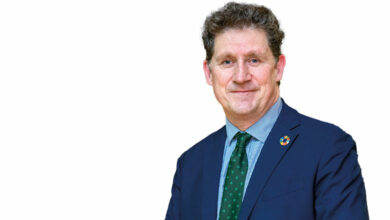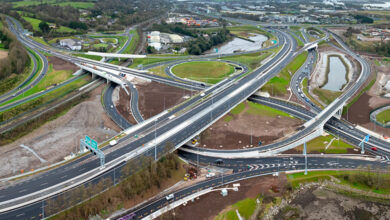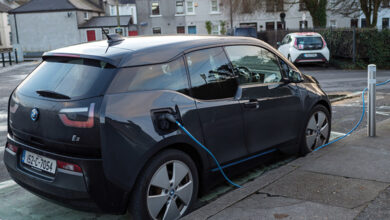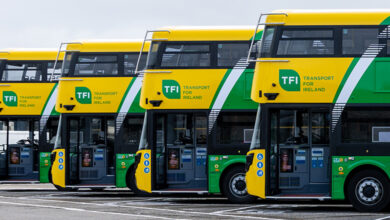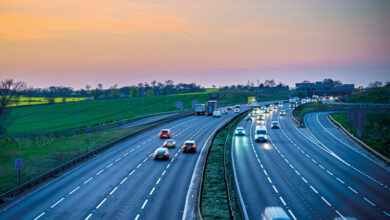Fuelling transport: security, competitiveness and affordability
 Derval Cummins, Head of Transport Ireland, and Barry O’Flynn, Head of Cleantech Ireland, examine the economic imperatives for sustainable transport.
Derval Cummins, Head of Transport Ireland, and Barry O’Flynn, Head of Cleantech Ireland, examine the economic imperatives for sustainable transport.
Ireland spends around €5 billion per annum importing oil products – a lot of money for our ailing economy. Of this, two-thirds are used by the transport industry accounting for 98 per cent of all transport fuels.
Across the European Union as a whole, the picture is similar but not quite as stark: transport consumes 55 per cent of oil import and oil accounts for 94 per cent of transport fuels. As some Member States are still producing oil, only 84 per cent of oil is imported overall but this proportion is growing. Ireland, lacking indigenous resources, is one of the most fuel dependent Member States.
As Europe’s problems of fuel affordability and fuel security are more pronounced in Ireland, the European Commission’s Clean Transport Initiative is particularly pertinent.
Addressing this unsustainable dependency of the economy on volatile global oil prices is key to Ireland’s economic recovery and competitiveness. However, it is an enormous but fundamental challenge to policy-makers, with the implications of any decisions underpinning all economic activities across the island.
The electricity sector has been making a steady shift to a lower carbon and more indigenous energy mix, with increased use of natural gas and indigenous renewable energy generation. Approximately 20 per cent of electricity consumed in the Irish market today is sourced from indigenous renewable energy resources, mostly wind energy. This target will increase to 40 per cent by 2020 and higher again by 2030 because of economic necessity and demand.
The transport sector on the other hand has gone in the opposite direction. As the economy grew, transport fuel consumption more than doubled over the past two decades and is currently responsible for one-third of national energy consumption. The Irish Government’s policy objectives, set in 2008, of having 10 per cent of transport fuel sourced from renewable sources and 10 per cent of all cars on the road being electric by 2020 are both increasingly unlikely.
To compound this, meeting 2020 emissions reduction obligations under current projections is looking questionable with the possibility of missing the target by anywhere between 7 and 24 million tonnes of CO2, cumulatively, or more than 5-8 million tonnes each year from 2020 onwards. Whilst the carbon prices for 2020 are unclear, the cost of missing targets is likely to be in excess of €200 million by 2020 and €50-80 million per annum thereafter.
It is not all bad news. Transport energy use has fallen 23 per cent since the peak in 2007, bringing it back to 2002 levels. However, the main reason for this is undoubtedly the decline in the economy leading to a decline in demand for transport. More positively, renewables, in the form of biofuels, and LPG were the only transport fuels to experience growth in 2011.
Fundamentally, running Ireland’s transport systems with costly, insecure, imported fuel creates an environment of escalating cost and uncertainty. This has the potential to make the movement of people and goods less efficient, increase the cost of doing business in Ireland, deter investment and take money out of the economy that could be put to better use. Success in lowering our transport fuel consumption overall depends on behavioural change leading to less travel by motorised modes and more by walking and cycling, using public transport instead of private car and having less travel overall. All these actions have the bonus of reducing congestion and in reducing demand for additional, costly, road space. Behavioural change drives a virtuous circle and is encouraged by improvements to the public transport system being implemented by the National Transport Authority.
Subtle tensions
Moving to cleaner transport fuels should, on the face of it, be easier than changing ingrained behaviours, but is actually complex due to subtle tensions between transport and energy policy which has meant that transport policy has been, at best, neutral on energy.
Firstly, clean fuel vehicles do nothing to reduce congestion so shifting trips to more sustainably fuelled cars does not solve congestion-related problems and could potentially slow down behavioural change. Secondly, clean fuel private vehicles could detract from the continuous improvement of public transport by making the case for investment more difficult and by undermining efforts to build a solid and growing critical mass of regular public transport.
Additionally, given the currently fragile financial position of public transport, there are priorities other than investing in its decarbonisation. Mostly, however, transport policy-makers have assumed that electric and other more cleanly fuelled vehicles would enter the fleet when the technology or product and the market were sufficiently ready, without the need for intervention.
Perhaps it is time to reconsider the need for intervention. Realistically, there are numerous trips in Ireland that will only ever be made by car or truck for the foreseeable future. In acknowledging the benefit of decarbonising, we can simultaneously recognise that Ireland has some of the most competitive renewable energy resources and infrastructure in the world.
The growth of indigenous, clean and secure renewable energy, with little or no fuel cost in the electricity sector, indicates the benefit of electrifying a significant portion of the national transport fleet. The inevitable global shift to electric vehicles and the fact that Ireland has a single electricity network operator enables fast infrastructure deployment. Ireland has the opportunity of being a first mover in this sector, developing the competencies and business models to accelerate electric vehicle take-up by consumers and the development and implementation of the related infrastructure.
By linking the benefits of long-term affordability, energy security, emission reductions and enterprise development, there is a powerful case to be made for a move towards the electrification of transport. Similarly, encouraging the development of an indigenous biofuel industry will stimulate both the agricultural industry and the fuel distribution industries, reducing fuel imports and reducing emissions as a consequence.
For heavier vehicles, converting the national fleet towards the use of compressed natural gas rather than petrol or diesel will generate long-term cost-savings and lower emissions. This is already being implemented by many of the global energy companies and vehicle manufacturers around the world. Public fleet procurement is a stepping stone to developing the necessary scale for a more resource-efficient and cleaner transport system, although the costs and benefits need to be assessed on a case-by-case basis, taking into account the remaining life of existing fleets.
Alternative fuel strategy
The European Commission’s Communication on the Clean Fuel for Transport initiative lays out an alternative fuel strategy for the long-term substitution of oil as the primary energy source for transport and provides a framework to guide investments and technological development. Ireland is well ahead of other Member States by virtue of the work done by the ESB and its ecars initiative. Progress needs to be maintained and efforts to join up energy and transport policy intensified as Ireland reconsiders to infrastructure investment to drive economic revival. For example, the Clean Fuel for Transport initiative could be a clear aim of the Strategic Framework for Investment in Land Transport, which is being developed by the Department of Transport, Tourism and Sport.
Finally, bringing together the themes of Ireland’s unsustainable imported fossil fuel dependency, abundant renewable energy resources, unique electricity network, strong R&D and ICT sectors, and challenging 2020 obligations as a stimulus is a unique proposition for the economy.
By developing and implementing a clean, efficient and affordable world-class transport, Ireland will not only systematically and permanently reduce future costs to the national economy. It will also make the economy more competitive and we will have developed a knowledge base and set of capabilities that other countries will want.
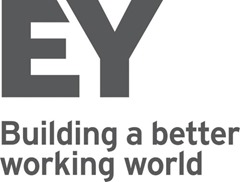 Derval Cummins
Derval Cummins
Head of Transport Ireland, EY
Tel: +353 1 475 0555
Email: derval.cummins@ie.ey.com
Barry O’Flynn
Head of Cleantech Ireland, EY
Tel: +353 1 475 0555
Email: barry.oflynn@ie.ey.com


